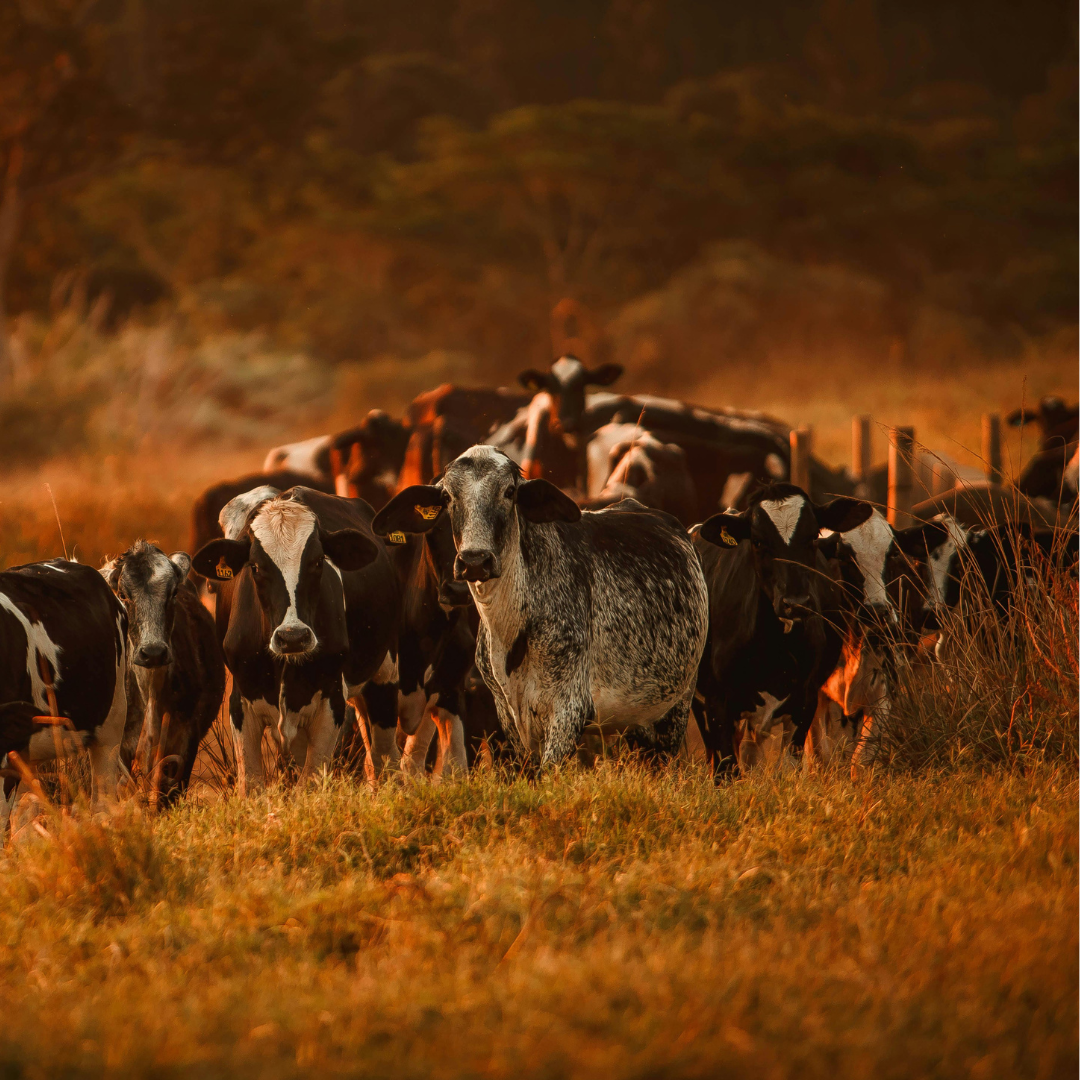
What Are Certified Organic Organ Meats & Why Does It Matter?
We all know the saying ‘we are what we eat’, but how true does this ring when it comes to eating organ meats and just how important is choosing Australian certified organic when shopping for organ meats?
Organic farming is the production of food without the use of synthetic chemicals or genetically modified components, that promotes ecological balance, and conserves biodiversity.
Sourcing organic produce is becoming increasingly important to many, and organ meats are no exception. But as organic sourcing becomes a defining factor when selecting which produce or organ meats to eat, the marketing around organic produce is becoming progressively distorted, often taking advantage of this growing demand without authenticating the source as organic.
You may be wondering how we as discerning consumers are meant to authenticate a product as organic whilst the use of this term is so overly saturated. This is where organic certification becomes important, as only when a product is ‘certified’ organic can it be legitimised as truly of organic origin.
Certified organic organ meats are not only defined as coming from livestock that are grass-fed, or naturally grazed. Whilst these are certainly contributing factors to yield high quality organ meats, unless livestock are organically produced following the rigorous set of criteria to obtain organic certification, there is still room for synthetic pesticides, antibiotics, and heavy metals to creep in.
We’re going to break down the key criteria that livestock must meet to achieve organic certification and the benefits of eating certified organic organ meats for our health, animal welfare, and the environment.
What qualifies livestock to be Australian certified organic?
Let’s start with what qualifies livestock to attain organic certification in Australia and why that should influence you when shopping for organ meats.
There are several certification bodies in Australia which base their certification standards on the National Standard for Organic and Biodynamic Produce (AS 6000-2015).This Australian standard helps to inform the key criteria to qualify livestock as certified organic, which include:
- Nutrition
- Breeding
- Disease prevention and treatment
- Welfare
- Livestock handling
- Livestock housing
- Livestock identification
Let’s dive a little deeper into some of these points:
Nutrition
Nutrition for organic livestock is vigorously considered to ensure quality production under sustainable systems while achieving the livestock’s nutritional requirements. Livestock must be provided with a wide variety of food natural to their diet which will never include antibiotics, medicinal substances, growth promoters, or GMO products, and force feeding of animals is prohibited. Free access to mineral supplements (such as mineral licks) is also a necessity to fulfill their nutritional requirements.
For grazed animals to be considered part of an organic production system, the grazing area needs to meet specific criteria. Part of this criteria includes the grazing activities not disrupting the sustainability of the natural ecosystem, and soil structure in degraded areas must be re-developed to reflect natural soil structure. The pasture they are grazed on must be organically managed, so it can’t be sprayed with toxic synthetic pesticides or synthetic fertilizer.
Breeding
There are strict parameters around breeding, including encouraging natural breeding methods and prohibiting genetic engineering amongst other unnatural breeding techniques.
Disease prevention and treatment
Should livestock fall ill, homeopathic (e.g., plant, animal, or mineral substances), or Phyto therapeutic (e.g., Plant extracts/essences etc.) products are to be used in the first instance. Only if initial natural treatments are unsuccessful, should allopathic veterinary drugs or antibiotics be used, however such treatment would then prevent the livestock from being marketed as organic or biodynamic.
Welfare
Animal welfare is a basic principle of organic livestock production. Free movement, including free ranging during day light hours, food, water, shelter, and shade are key living conditions that are to be met to achieve organic certification. There are also strict requirements around the slaughter of livestock, where slaughter must be undertaken in a manner that reduces stress and suffering and in accordance with the relevant Codes of Animal Welfare Practice.
Livestock handling
Transporting of organic livestock is carried out to minimise stress and injury, with the use of any electrical stimulation or synthetic chemical tranquillisers prohibited. When transporting organic livestock, vehicles must be dedicated to organic livestock only, or be cleaned before loading organic livestock. All handling and transport of organic livestock is carried out in accordance with the relevant Commonwealth, State or Territory codes of animal welfare practice.
Livestock housing
Although organic livestock will be predominantly outdoors, there are certain times where livestock will require housing due to pregnancy or extreme weather. When livestock are housed under said circumstances, the building must satisfy their biological and behavioural needs. The housing facility will have access to natural light and ventilation, protection from predators, freedom of movement, clean water and food, amongst other criteria.
Livestock identification
Identification and recording are critical components of achieving organic certification as this is how the organic process is legitimised from production through to preparation, transport, and marketing.
As you can see, the process to attain organic certification is thorough, and is audited annually. As the term ‘organic’ can be used so loosely on a product without any legal repercussions, it is important that as consumers, we hold businesses accountable for the claims they are making if they do not have organic certification. If a product is claiming to be of organic origin without certification, request that the business explain how its processes ensure its product is of true organic origin.

Are grass-fed organ meats of the same quality as organic organ meats?
Well, the short answer is no. Most of us know by now that feeding livestock their natural diet as opposed to grains is always going to yield a higher quality produce and higher quality organ meats. What many do not realise is that unless livestock are also organically grazed, then conventional grass-fed livestock can still be grazed on grass that is often assisted with synthetic fertilisers and pesticides.
On the other hand, eating ONLY organic (without grass-fed status), can mean that the livestock have still been fed a feed as opposed to naturally grazed for their full lifespan.
Just to make things even more confusing, the term ‘grass-fed’ is also loosely applied in Australia, where claims to be ‘grass-fed’ can be made despite the livestock being grain-fed for it’s final 30 days. Talk about smoke and mirrors!
To summarise, organic certification isn’t the ONLY characteristic to look for when sourcing organ meats. and instead, it is best practice to be seeking out organ meats that meet the following non-negotiables:
- Certified Organic
- 100% Grass fed AND grass finished
Some are choosing to go one step further and opting to add regeneratively farmed to the list of non-negotiables. Regenerative Agriculture is a way of raising animals that closely mirrors how ruminants have grazed on the grasslands of earth for eons. Regenerative Agriculture implements rotational grazing practices to preserve the natural environment and create a healthier ecosystem.
What are the benefits of choosing certified organic organ meats?
Now that you’re familiar with the rigorous process to achieve organic certification, you must be wondering what the benefits of choosing certified organic organ meats over conventionally sourced organ meats are.
When compared to conventionally raised livestock, organic grass-fed and finished livestock organ meats offer the following benefits:
More nutrients
Studies have shown that there are compositional differences between organic and conventionally raised livestock. And whilst there are no specific studies exploring the differences in organ meats specifically, we can hypothesise by reviewing results from studies that compare conventional grain fed meat to organically raised meat. Organically raised, grass-fed meat has been shown to contain 50% higher Omega-3 fatty acids, higher levels of CLA, greater antioxidants, and to be higher in several key nutrients, including Vitamin E, beta carotene, and Vitamin C.
Better for the animal
The strict protocols for raising certified organic livestock here in Australia mean that each animal lives a nurtured life as closely to that they would be living in the wild. So you can rest assured knowing that the animal lived a full life before providing you with your nutrient packed organ meats.
Nurtures the environment
Organic farmers carefully use practices that minimise any negative impacts to the surrounding environment. The grazing practices involved in raising organic livestock help to sequester carbon in their fields by recycling manure into pasture production, avoiding nutrient runoff. The prohibition of synthetic fertilisers and pesticides helps to preserve the natural ecosystem which is a big benefit of choosing certified organic organ meats.
Fewer toxins
Choosing organic organ meats limits our exposure to undesirable toxins by prohibiting the use of fertilisers and pesticides such as glyphosate, therefore reducing our pesticide load.
Reduces antibiotic resistance
Antibiotic use in conventional livestock production is a key driver of antibiotic resistance in society. As organic organ meats come from livestock that has been strictly raised without the use of antibiotics, choosing organic organ meats limits antibiotic exposure, and potential tolerance from overuse.
Where can you source Australian certified organic organ meats?
With organ meats only just making their way back onto our menus, sourcing Australian certified organic organ meats can sometimes prove challenging. Unless you’ve befriended your local butcher and can guarantee an ongoing fresh supply, opting for freeze-dried organ supplements may be the most viable option.
Cell Squared freeze-dried beef organs and powders are made from Australian certified organic beef. We’ve done the leg work for you to ensure our beef organs are organically and regeneratively sourced, grass-fed, AND finished, GMO free, and can guarantee that our livestock live happy and healthy lives freely roaming on open pastures. You can discover more about our sourcing here >> Shop 'Nose To Tail' Organic Beef Organs Capsules & Powder | Cell Squared — Cell Squared
Our beef organ powder and beef liver powder are now 100% Australian Certified Organic under our registration with the ACO, and we are working towards achieving certification for our capsules also.

Conclusion
Choosing to source Australian certified organic, grass fed AND finished organ meats is not only better for the animal and environment, but for our bodies, too. Whether you choose to eat fresh or freeze-dried organ meats, like our organic, grass-fed beef liver powder, incorporating certified organic organ meats can provide a diverse nutritional edge to help optimise your health.
Try Cell Squared’s range of meticulously tested, organic, freeze-dried organ supplements with FREE SHIPPING Australia wide on orders over $88.





